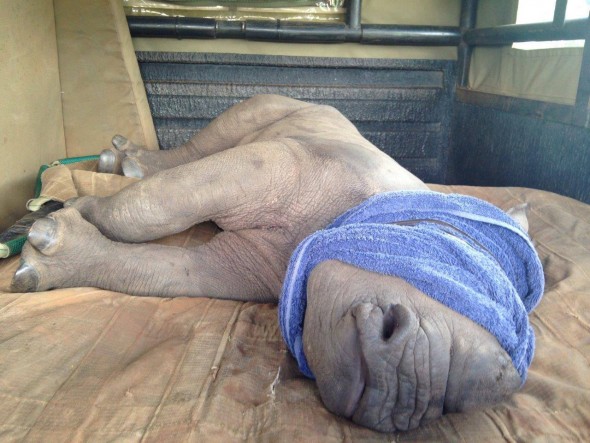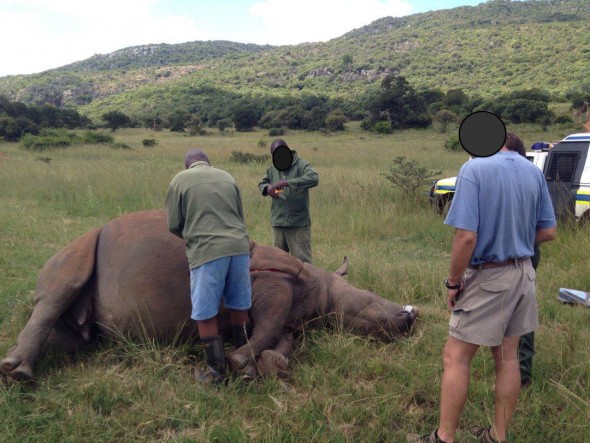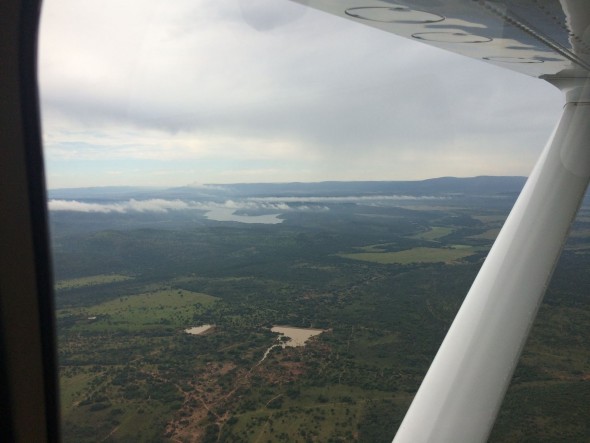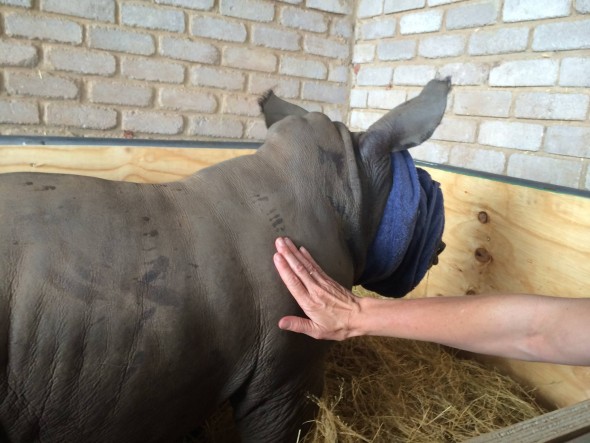
Another Calf Orphaned as SA Rhino Owners face Sophie’s Choice
The savage poaching epidemic in South Africa – that has seen over 54 rhino poached in the first six weeks of this year in the Kruger National Park alone – has an impact on not only the rhino, but on the humans who work tirelessly to protect them and are faced with excruciatingly difficult decisions. Karen […]

The savage poaching epidemic in South Africa – that has seen over 54 rhino poached in the first six weeks of this year in the Kruger National Park alone – has an impact on not only the rhino, but on the humans who work tirelessly to protect them and are faced with excruciatingly difficult decisions.
Karen Trendler, coordinator of the Endangered Wildlife Trust (EWT) Rhino Response Project, detailed the “Sophie’s Choice” faced by rhino owners in a Facebook post this week which went viral, after yet another calf was orphaned last weekend, and its owners left devastated.

This is Karen Trendler’s story:
The ‘Sophie’s choice’ faced by rhino owners following a poaching incident…
“Over the past three years, I have, as coordinator of the EWT Rhino Response Project responded to a large number of rhino poaching incidents – each and every one tough, challenging and tragic. This weekend I responded to an incident that has, yet again highlighted the ‘Sophie’s choice’ situation that a poaching incident forces rhino owners into. It was, another ‘yet again’ desperate insight into the trauma and stress suffered by rhino owners confronted with a poaching incident.

“For obvious security and confidentiality reasons, I have excluded names and location.
“In November last year, an attempted poaching shook this farm – an absolute haven of peace for rhino, guests and wildlife. Two adult rhino were shot, fortunately as a result of rapid response on the part of the owners, the poachers did not get any horn and with veterinary treatment, both rhino survived but still carry the bullets.
“Security was stepped up. At the time of the poaching, good security, an anti poaching program and every indication of responsible rhino ownership was in place. All of the staff were polygraphed and cleared of any involvement. (Sadly in many cases, there isn’t adequate or any security and staff are involved.) Not so in this case. In fact the staff are an integral part of management and ownership.
“Late last week, just as the family was sitting down to dinner, three shots rang out. A response was mobilized and the local rhino protection group all jumped in to help.
“On following the blood trial, the rasping sounds of a critically wounded rhino could be heard. The cow had taken a lung shot. Knowing that one of two cows, both with calves (newborn and 4 weeks of age) had been shot, and also knowing that working at night in the dark is not advisable, the team sat close by but didn’t risk disturbing the cow and calf. Through the night they could hear the cow’s laboured breathing and the calf moving around her and occasionally suckling and nuzzling its mother.
“Having attended a talk by Jane Goodall, my phone had been on silent and on returning to the car, was inundated with frantic calls from owner and vets. There was little to be done that night but a sleepless night thinking of the rhino, her tiny calf and desperate owners, followed.
“Forty minutes to prepare for a flight, response and get to airport. Emergency kits were repacked (reduced in weight and size as we would be flying in a small plane with little space). All the way to the airport and on the flight, frantic calls and plans were made to get a rhino ‘ambulance’, veterinary support and suitable help for the calf.

“From years of working in wildlife response, I have learnt to become professionally detached during the crisis and focus on the issues and decisions at hand. One becomes better at dealing with and processing the trauma, sadness and anger. But this response has really got to me on so many levels and I am tearful as write this paragraph…
“The fatally wounded cow, struggling for breath, cared for her calf through the night. Soon after sunrise she walked her calf out of the thick bush and into a clearing where the team were waiting, allowed the calf to suckle one last good feed from mom – collapsed and died.
“The calf was captured and sedated, blindfolded; laid on a soft mattress in the back of a land cruiser.
“And while the chaotic and gruesome process of post mortem and investigation took place – we drove the little calf through to a safe place where another team waited to take on his care. He travelled beautifully and slept deeply under sedation, just needing a small top up of drugs during the trip.
“Monitoring him en route I was taken by what a big, beautiful, healthy boy he was – big for his age and in prime condition. His mom was apparently a great mother, of prime heritage and breeding stock (the best of a combination of Kruger Park and the original KZN clan). As I counted his breaths, monitoring his vital signs and gently stroked his rump and felt in his thigh to check his temperature, it struck me, that this time yesterday, this had been a happy, healthy little rhino calf, a short four weeks into his new life, gamboling around in the safety of security of his large mom.
“A few shots, and his life had changed irrevocably. But not just his life –the life of all on the farm. Twenty-two years of building a haven, a sanctuary, a safe place, a successful business and an amazing team – all part of the dream – shattered by a rhino poaching and a greed for rhino horn.
“Many are aware of the cruelty of rhino poaching, the pointless loss of life, orphaned calves and threats to conservation. There is a growing awareness of the impact on those working at the frontlines (the vets, rangers, anti poaching teams, investigators and response staff), the trade debate has raged ad nauseum, but little focus has been on the realities and impacts of a poaching (frequently repeated incidents) on the owners, staff and families or of the terrible Sophie’s choice they face in deciding what to do next…not only is it about what to do with one’s rhino, coping with the trauma of a poaching which is no less traumatic than a home invasion or hijacking but also the big business that rhino poaching has become and not just for the poachers!
“The Sophie’s choice…the owners are faced with heart rending and tough decisions about safety, security, economic and humane considerations. Do they keep the remaining rhino, two of which are heavily pregnant, one cow with a newborn calf and two bulls with huge horns? Possibly putting themselves, rhino and staff at risk? Do they bring in more security at a massive expense that has already required various means to release additional funding (they already have trained, armed anti poaching staff on site and anti poaching teams don’t come cheaply)!
“Do they take up an offer to sell their rhino to a facility far away that hunt and can offer a reasonable price for the rhino (the very last thing that this family would want)? Do they take up an offer where the rhino will not be hunted but the price offered is crazily low? Do they transfer their rhino to another place in the hope that they will be safe? Any move of these rhino right now – whether sold or simply transferred, carries risks associated with capture, immobilization and transport. Wild caught rhino risk maladjustment syndrome and may refuse to eat in captivity or may not adapt to a new habitat or environment. The heavily pregnant cows and the cow and newborn calf are a risk for transport as are the two adults only recently recovered from gunshot wounds and still carrying the poaching bullets.

“And before firing off about owners just being in it to trade horn or hunt – this is a non-hunting operation, a haven for wildlife with relaxed animals and a tranquil atmosphere, the owners do not want to trade in horn – they are the type of owners that are there for the rhino and know each rhino by name and nature.
“I don’t like using Facebook or responses to raise funds or ask for help – but help in this case is needed, even if just to provide extra help, security and support for the owners and anti poaching teams whilst making these tough choices. Even just words of support
“The good news is that the little calf was safely offloaded into caring hands and is doing well. There are other rhino, big and little as company and thanks to caring owners, great vets and good response all round – he had, under horrible, circumstances an easier time than many of the orphaned calves (handling the calves properly and with care during the capture and transport really makes a difference and he will recover and settle quicker than those who are not handled well…but the reality remains – he would be better off with his mom in the wild and the family wouldn’t be faced with Sophie’s Choice…
“Warmest thoughts and strength to the family and staff. Thanks to all who were on standby and supported the response.”
Rhino Orphan Response Project – Endangered Wildlife Trust
A sinister by-product of South Africa’s current rhino poaching crisis is the dramatic increase in the number of injured and orphaned rhino calves. To address this, the Rhino Orphan Response Project was developed as a partnership between the Endangered Wildlife Trust and Ms Karen Trendler, an internationally recognised expert in rhino rehabilitation. The project has facilitated the implementation of a coordinated rhino calf rescue response network based on international wildlife response and rehabilitation principles, to ensure the rehabilitation of these orphaned or injured calves back into the wild.
With a rapid intervention and coordinated rescue response network in place, where the appropriate handling, rearing and rehabilitation protocols are implemented, many of these poaching orphans and casualties can be successfully treated and rehabilitated back into the wild.
The EWT Rhino Orphan Response Project has developed protocols and Standard Operating Procedures. It also presents training workshops and specially tailored training and skills development to suit various needs.
Karen Trendler –
Rhino Response Co-ordinator cell 072 969 4499 karojay@global.co.za
Kirsty Brebner – EWT Rhino Project; Manager
cell 082 784 8420 kirstyb@ewt.org.za
EWT Endangered Wildlife Trust
Private Bag x 11 Modderfontein 1645, Johannesburg South Africa
Tel + 27 11 372600
NPO 015 – 502 PBO 930 001 777website: http://www.ewt.org.za/RHINO/rhino.html
Facebook: www.fb.com/EndangeredWildlifeTrust
Donations: www.givengain.com/cgi-bin/giga.cgi?cmd=donate&cause_id=2347
Supporting EWT in SA through loyalty cards: www.ewt.org.za/marketing.html
